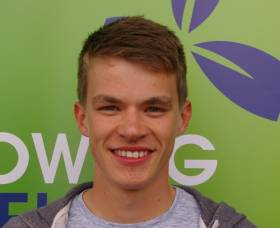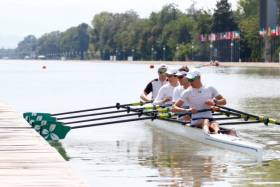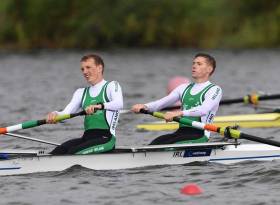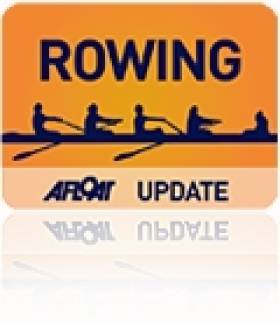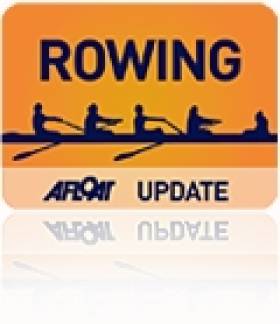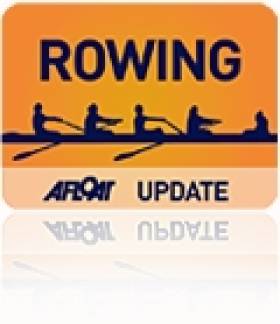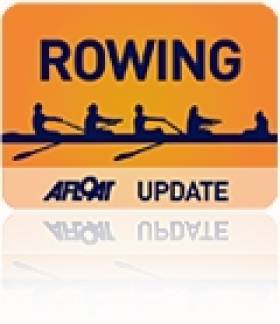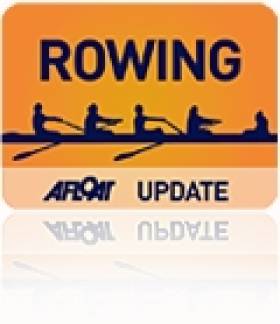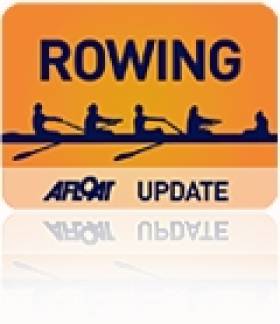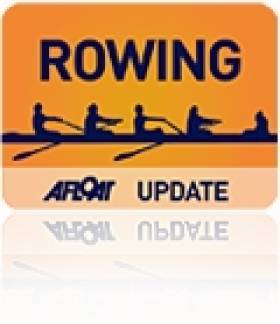Displaying items by tag: World Under23 Championships
#Rowing: Ireland’s Fintan and Jake McCarthy took second in the B Final, eighth overall, at the World Rowing Under-23 Championships in Plovdiv, Bulgaria. In temperatures already in the twenties, Chile and Japan were fastest over the first half of the race, with Ireland back in fourth. Through the second 1,000 metres, Chile took over the clear lead and Ireland moved up into second. They challenged the Chileans but could not catch them.
The race was a five-boat contest, as Britain’s Matt Curtis and Gavin Horsburgh pulled out for medical reasons.
World Rowing Under-23 Championships (Irish interest)
Men
Lightweight Double Sculls – B Final (Places 7 to 12): 1 Chile 6:27.09, 2 Ireland (F McCarthy, J McCarthy) 6:28.58, 3 Japan 6:31.52.
#Rowing: Ireland took a second medal at the World Rowing Under-23 Championships in Bulgaria today. The lightweight quadruple of Niall Beggan, Stephen O’Connor, Andrew Goff and Shane O’Connell took bronze behind Switzerland and Austria.
Austria and Switzerland swapped the lead through the race, but the Swiss edged ahead in the final quarter. Ireland had a fine middle 1,000 metres and won their battle with Britain to gain a place in the medals. They were third as the crews drove for the line, but came within .28 of a second of catching the Austrians, who took silver.
Ireland’s David O’Malley and Shane Mulvaney took a bronze medal in the final of the lightweight pair.
World Under-23 Championships, Plovdiv, Bulgaria (Irish interest)
Men
Lightweight Pair – A Final: 1 Italy 6:33.05, 2 Turkey 6:36.70, 3 Ireland (S Mulvaney, D O’Malley) 6:37.63; 4 Britain 6:45.33, 5 France 6:46.74, 6 Denmark 6:53.36.
Lightweight Quadruple Sculls – A Final: 1 Switzerland 5:50.62, 2 Austria 5:52.09, 3 Ireland (N Beggan, S O’Connor, A Goff, S O’Connell) 5:52.37; 4 Britain 5:54.55, 5 Italy 5:56.46, 6 France 5:56.82.
Lightweight Double Sculls – Semi-Finals (First Three to A Final; rest to B Final)
Semi-Final One: 1 Denmark 6:18.69, 2 Italy 6:21.85, 3 Germany 6:23.22.
Semi-Final Two: 1 Canada 6:19.88, 2 Spain 6:20.66, 3 South Africa 6:21.69; 4 Ireland (F McCarthy, J McCarthy) 6:22.56, 5 Britain 6:23.77, 6 Poland 6:42.15.
#Rowing: Ireland’s David O’Malley and Shane Mulvaney took a bronze medal at the World Rowing Under-23 Championships in Plovdiv, Bulgaria today. Italy won a tense race. Turkey led early on, but Italy and Ireland came through fast. With 500 metres to go, Italy had taken the lead with Ireland and Turkey just behind. In the final quarter, Italy secured first with Turkey just rebuffing Ireland to take the silver. Mulvaney and O’Malley had taken bronze a year after just missing out on a medal.
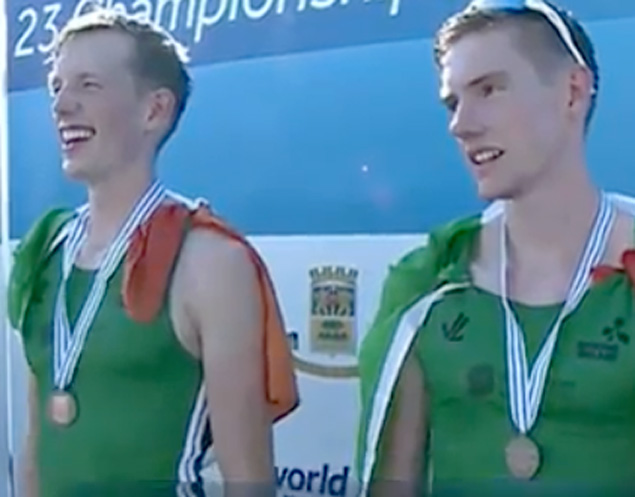 David O'Malley and Shane Mulvaney with Bronze Medal at World Under-23
David O'Malley and Shane Mulvaney with Bronze Medal at World Under-23
World Under-23 Championships, Plovdiv, Bulgaria (Irish interest)
Men
Lightweight Pair – A Final: 1 Italy 6:33.05, 2 Turkey 6:36.70, 3 Ireland (S Mulvaney, D O’Malley) 6:37.63; 4 Britain 6:45.33, 5 France 6:46.74, 6 Denmark 6:53.36.
Lightweight Double Sculls – Semi-Finals (First Three to A Final; rest to B Final)
Semi-Final One: 1 Denmark 6:18.69, 2 Italy 6:21.85, 3 Germany 6:23.22.
Semi-Final Two: 1 Canada 6:19.88, 2 Spain 6:20.66, 3 South Africa 6:21.69; 4 Ireland (F McCarthy, J McCarthy) 6:22.56, 5 Britain 6:23.77, 6 Poland 6:42.15.
O'Donovan Sprints Into Final at World Under-23 Rowing
#ROWING: Paul O’Donovan produced an excellent finish to take second in his semi-final of the lightweight single scculls at the World Under-23 Rowing Championships in Varese in Italy today. Enes Kusku of Turkey set a hot pace and won, while behind him O’Donovan had to see off a number of challengers to secure the top-three spot. He was third at 1500 metres, but passed Francesco Genoraro of Italy coming up to the line and almost caught Kusku.
World Under-23 Rowing Championships, Varese, Italy (Selected results; Irish interest)
Men
Four – B Final (Places 7 to 12): 1 Croatia 6:09.17, 2 Belarus 6:10.60
3 China 6:11.76, 4 Serbia 6:14.24, 5 France 6:15.88, 6 Ireland (R Bennett, K Neville, F McQuillan-Tolan, R O’Callaghan) 6:20.33.
Lightweight Single Sculls – Semi-Final One (First Three to A Final; rest to B Final): 1 Turkey (E Kusku) 7:11.73, 2 Ireland (P O’Donovan) 7:11.91, 3 Italy (F Pegoraro) 7:12.30; 4 Netherlands 7:15.25, 5 Germany 7:17.22, 6 Greece 7:29.74.
#ROWING: Ireland’s men’s four reached tomorrow’s semi-finals of the World Under-23 Rowing Championships by finishing third in their repechage today. Belarus and Serbia finished first and second, with Ireland showing their determination to stay in the Championships by taking the final qualification spot. Russia, who are a bigger crew than the Irish, lost out by finishing fourth.
World Under-23 Rowing Championships, Varese, Italy, Day Two (Irish interest; selected results)
Men,
Four – Repechage (First Three to A/B Semi-Finals): 1 Belarus 6:18.7, 2 Serbia 6:24.33, 3 Ireland (R Bennett, K Neville, F McQuillan-Tolan, R O’Callaghan) 6:28.54, 4 Russia 6:31.41.
Lightweight Double Sculls – Heat Three (First Two Directly to A/B Semi-Finals; Rest to Repechage): 1 France (P Houin, D Debourdeau) 6:34.72, 2 Italy (F Gherzi, N Forcellini) 6:37.86;
3 Ireland (S O’Driscoll, G O’Donovan) 6:38.34, 4 Serbia 6:54.08, 5 Poland 7:04.23,
Women,
Lightweight Single Sculls – Heat Three (First Two Directly to A/B Semi-Finals; Rest to Repechage): 1 Cyprus 8:04.62, 2 France 8:06.67; 3 Britain 8:13.89, 4 Ireland (D Walsh) 8:22.48, 5 Russia 8:26.00.
#WorldUnder-23Rowing: The Ireland heavyweight four finished third in their B Final, ninth overall, at the World Under-23 Championships in Linz in Austria this morning. Croatia won the race and Lithuania, after duelling with Ireland in the middle stages, secured second. The Ireland crew of Richie Bennett, Matthew Wray, John Mithcell and Rob O’Callaghan held off Norway for third. Britain withdrew as they had to call on one of the members of the crew for their quadruple scull.
Adam Boreham, the reserve for the men's heavyweight crews, finished sixth in the D Final of the men's single sculls, 24th overall.
World Under-23 Rowing Championships, Linz, Austria, Day Four (Irish interest, selected results)
Men
Four – B Final (places 7 to 11): 1 Croatia 6:14.55, 2 Lithuania 6:17.00, 3 Ireland (R Bennett, M Wray, J Mitchell, R O’Callaghan) 6: 19.24, 4 Norway 6:19.29. Britain did not start.
Pair - (First Three to A Final; rest to B Final) – Semi-Final One: 1 South Africa (D Hunt, V Breet) 6:46.15, 2 Greece (K Christomanos, A Dafnis) 6:49.16, 3 Serbia (M Vasic, R Deric) 6:49.47; 4 Hungary 6:50.31, 5 Ireland (S O’Connor, F McQuillan-Tolan) 6:59.77, 6 Lithuania 7:20.32.
Lightweight Double Sculls – (First Three to A Final; rest to B Final) – Semi-Final One: 1 Germany (M Moos, J Osborne) 6:36.55, 2 Italy (L Barbaro, S Molteni) 6:37.75, 3 Spain (J de Haz, J Zabala Artetxe) 6:37.88; 4 Poland 6:38.49, 5 Ireland (S O’Driscoll, G O’Donovan) 6:46.30, 6 Norway 6:48.13.
Lightweight Single Sculls – (First Three to A Final; rest to B Final) – Semi-Final One: 1 United States (A Campbell) 7:11.15, 2 Ireland (P O’Donovan) 7:12.58, 3 Britain (Z Lee-Green) 7:14.26; 4 Australia 7:22.67, 5 Italy 7:24.34, 6 Germany 7:28.69.
Single Sculls - D Final (places 19 to 24): 6 Ireland (A Boreham) 7:36.40.
Women
Lightweight Single Sculls – (First Three to A Final; rest to B Final) – Semi-Finals Two: 1 Greece (A Nikolaidou) 7:54.92, 2 Austria (A Berger) 8:00.22, 3 Ireland (D Walsh) 8:00.28; 4 France 8:04.30, 5 Germany 8:11.25, 6 Cyprus 8:11.63.
#WorldUnder-23Rowing: Ireland qualified two more boats for the A Finals of the World Under-23 Rowing Championships at Linz in Austria this morning, nailing top-three places in the semi-finals to join the women’s four in the hunt for medals.
Denise Walsh started the day well for the team in green by qualifying in the lightweight single sculls. Aikaterini Nikolaidou of Greece led the semi-final all the way down the course and won. Walsh and Anna Berger of Austria got away from Julie Marechal of France to secure second and third, with the Austrian pipping the Skibbereen woman for second.
The favourite for gold, Andrew Campbell Jr of the United States, set the pace in the second semi-final of the lightweight single sculls. Paul O’Donovan again had a slow start and by half way still trailed the American by more than a length. O’Donovan, characteristically, closed on his rival in the second half, but Campbell held him off. Zak Lee-Green of Britain took the third qualifying place.
In the men’s pair, Fionnán McQuillan-Tolan and Seán O’Connor finished fifth in a race in which South Africa, Greece and Serbia took a grip of the qualifying places quite early.
Ireland’s lightweight double scull of Shane O’Driscoll and Gary O’Donovan fought their way from sixth to fourth in the middle stages of their semi-final, but could not break into the top three. Poland pushed them into fifth in the second half of the race.
World Under-23 Rowing Championships, Linz, Austria, Day Four (Irish interest, selected results)
Men
Pair - (First Three to A Final; rest to B Final) – Semi-Final One: 1 South Africa (D Hunt, V Breet) 6:46.15, 2 Greece (K Christomanos, A Dafnis) 6:49.16, 3 Serbia (M Vasic, R Deric) 6:49.47; 4 Hungary 6:50.31, 5 Ireland (S O’Connor, F McQuillan-Tolan) 6:59.77, 6 Lithuania 7:20.32.
Lightweight Double Sculls – (First Three to A Final; rest to B Final) – Semi-Final One: 1 Germany (M Moos, J Osborne) 6:36.55, 2 Italy (L Barbaro, S Molteni) 6:37.75, 3 Spain (J de Haz, J Zabala Artetxe) 6:37.88; 4 Poland 6:38.49, 5 Ireland (S O’Driscoll, G O’Donovan) 6:46.30, 6 Norway 6:48.13.
Lightweight Single Sculls – (First Three to A Final; rest to B Final) – Semi-Final One: 1 United States (A Campbell) 7:11.15, 2 Ireland (P O’Donovan) 7:12.58, 3 Britain (Z Lee-Green) 7:14.26; 4 Australia 7:22.67, 5 Italy 7:24.34, 6 Germany 7:28.69.
Women
Lightweight Single Sculls – (First Three to A Final; rest to B Final) – Semi-Finals Two: 1 Greece (A Nikolaidou) 7:54.92, 2 Austria (A Berger) 8:00.22, 3 Ireland (D Walsh) 8:00.28; 4 France 8:04.30, 5 Germany 8:11.25, 6 Cyprus 8:11.63.
#WorldUnder-23Rowing: Shane O’Driscoll and Gary O’Donovan brought Ireland a second semi-final place this morning at the World Under-23 Championships at Linz in Austria. The repechage of the lightweight double sculls turned into a three-way battle for two places between Ireland, Britain and Chile. The Irish got through in second, securing qualification. Britain won the race by a single second.
Paul O'Donovan, Gary's younger brother, had secured his semi-final place by winning his quarter-final of the lightweight single sculls.
Adam Boreham, who travelled as a reserve for the Ireland pair and four, finished sixth in quarter-final of the men’s single sculls and and sixth in the C/D semi-finals. He will compete in the D Final for places 19 to 24.
World Under-23 Rowing Championships, Day Two (Irish interest, selected results)
Men
Single Sculls – (First Three to A/B Semi-Finals; rest to C/D Semi-Finals) – Quarter-Final Four: 1 Germany (H Trzybinski) 7:13.77, 2 Belgium (H Obreno) 7:16.00, 3 Norway (J Boehn) 7:19.41; 4 Australia 7:20.20, 5 United States 7:27.76, 6 Ireland (A Boreham) 7:42.11. C/D Semi-Finals: 6 Boreham 7:36.30.
Lightweight Double Sculls – Repechage Two (First Two to A/B Semi-Finals; rest to C/D Semi-Finals): 1 (S Sykes, J Copus) 6:49.89, 2 Ireland (S O’Driscoll, G O’Donovan) 6:50.89; 3 Greece 6:52.79, 4 Chile 6:59.23, 5 Slovenia 7:02.67.
Lightweight Single Sculls – (First Three to A/B Semi-Finals; rest to C/D Semi-Finals) – Quarter-Final Three: 1 Ireland (P O’Donovan) 7:11.32, 2 Turkey (E Kusku) 7:14.06, 3 Hungary (B Tamas) 7:14.54; 4 Chile 7:17.11, 5 Mexico 7:35.88, 6 Estonia 7:46.20.
O'Donovan Continues Winning Ways at World Under-23 Rowing
#WorldUnder-23Rowing: Paul O’Donovan won his quarter-final of the lightweight single sculls at the World Under-23 Championships in Linz in Austria this morning after an interesting race. Enes Kusku of Turkey led – and led well – for much of the race, with Bence Tamas of Hungary and O’Donovan filling the next two qualification places. But O’Donovan is a good judge of a race and has an effective sprint finish. He sped past Kusku to win by 2.28 seconds.
World Under-23 Rowing Championships, Day Two (Irish interest, selected results)
Men
Lightweight Single Sculls – (First Three to A/B Semi-Finals; rest to C/D Semi-Finals) – Quarter-Final Three: 1 Ireland (P O’Donovan) 7:11.32, 2 Turkey (E Kusku) 7:14.06, 3 Hungary (B Tamas) 7:14.54; 4 Chile 7:17.11, 5 Mexico 7:35.88, 6 Estonia 7:46.20.
#WorldUnder-23Rowing: The Ireland women’s four secured the first A Final place for Ireland at the World Under-23 Rowing Regatta at Linz in Austria today. The crew of Emily Tormey, Ailish Sheehan, Aifric Keogh and Lisa Dilleen needed to finish in the top two of their repechage to get through, and by the closing stages Ireland and Poland were on their way to those places. However, Ireland beat Poland into second to improve their lane draw in the final.
The Ireland men's four of Richie Bennett, Matthew Wray, Jonathan Mitchell and Rob O'Callaghan will row in a B Final. They finished fifth in their repechage.
World Under-23 Rowing Championships, Day Two (Irish interest, selected results)
Men
Four – Repechage One (First Two to A Final; rest to B Final): 1 Germany 6:01.85, 2 Italy 6:03.35; 3 Croatia 6:05.59, 4 Norway 6:11.03, 5 Ireland (R Bennett, M Wray, J Mitchell, R O’Callaghan) 6:16.97.
Pair – (First Two Directly to A/B Semi-Finals; rest to Repechage) – Heat Two: 1 Australia (A Moore, A Hill) 6:37.37, 2 Ireland (S O’Connor, F McQuillan-Tolan) 6:49.15; 3 Russia 6:54.42, 4 Venezuela 7:05.10, 5 United States 7:09.48, 6 Estonia 7:15.64.
Lightweight Double Sculls – (First Two Directly to A/B Semi-Finals; rest to Repechage) – Heat Three: 1 France (D Piqueras, D Houin) 6:26.65, 2 Italy (L Barbaro, S Molteni) 6:31.96; 3 Ireland (S O’Driscoll, G O’Donovan) 6:37.40, 4 Russia 6:42.81, 5 Lithuania 7:05.01.
Women
Four – Repechage One (First Two to A Final; rest to B Final): 1 Ireland (E Tormey, A Sheehan, A Keogh, L Dilleen) 6:48.03, 2 Poland (A Budzynska, J Dittmann, M Cylwik, O Michalkiewicz) 6:48.59; 3 United States 6:54.09, 4 Italy 6:55.92, 5 France 6:58.66.
Lightweight Single Sculls – (First Two Directly to A/B Semi-Finals; rest to Repechage) – Heat One: 1 Belgium (E Peleman) 7:46.06, 2 Ireland (D Walsh) 7:50.87; 3 Croatia 7:52.54, 4 Germany 8:00.47, 5 Israel 8:04.22, 6 Argentina 8:06.23.


























